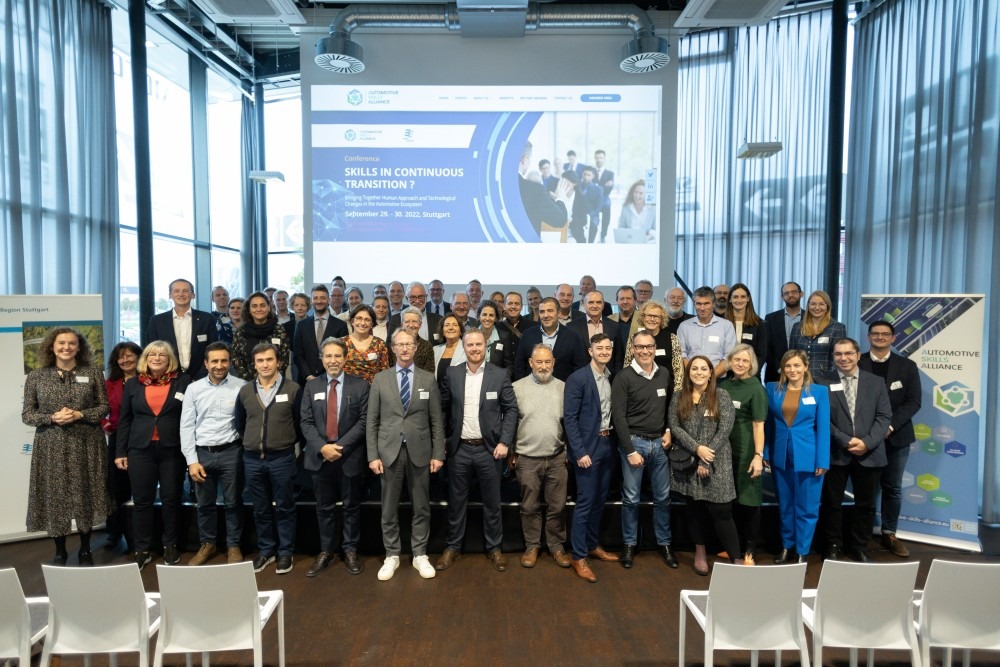
The upskilling and reskilling of the automotive workforce throughout the entire value chain has been at the centre of the first conference organised by the Automotive Skills Alliance. “Skills in continuous transition? Bringing together human approach and technological changes in the automotive ecosystem” held in Stuttgart on 29 and 30 September thanks to the support from the Stuttgart Region Economic Development Corporation.
The two-days event gathered at the MOTORWORLD Stuttgart participants from companies, institutions and academia, to discuss how to address the social and human challenges posed by the ongoing digital and green transformation.
The first dayshed light on several ongoing discussions and provided a lot of food for thought on both challenges and opportunities for the sector going forward.
The conference started with an opening from the host Sabine Stützle-Leinmüller, Head of Unit at Stuttgart Region Economic Development Corporation, highlighting the important role that the mobility ecosystem provides to regional economies.
The ASA President Jakub Stolfa stressed how the ASA can support all these challenges by collaborating: “There is great interest in the projects and initiatives that the ASA is pursuing at both the European and regional levels. Developing best practices and transversal collaborations by including all stakeholders, from industry to academia and institutions, is becoming increasingly important to solve several of the needs that many organisations are now experiencing for the first time. Coordination and new partnerships are crucial to enhance the rollout of a new working approach. The role of skills and life-long learning is taking a central stage on the EU agenda, and we are glad to see that the ASA is increasingly establishing itself as a pioneering initiative in this field. All that is being done in order to support and execute massive up-/re-skilling activities in the automotive-mobility ecosystem”
“Working together for the skills of today and tomorrow: the Pact for Skills is mobilising in value chains across Europe. Over 700 members have already joined forces to upskill and reskill people in Europe: why not join them?”, highlighted Alison Crabb from the European Commission (DG EMPL), who then reminded the audience how EU Commission President Ursula von der Leyen proposed to make 2023 the European Year of Skills in her last State of the Union address. Only the Automotive Skills Alliance alone brings more than 100 members as part of this Pact.
Manfred Schuckert from Daimler Trucks provided insights on the transformation of the energy system, as well as how the development of new powertrains is providing opportunities for a potential workforce.
Three panel debates looked at key points, from the challenges and opportunities to the best practices that are being developed at several levels. The challenges in the ecosystem were discussed from different angles by Andreas List (Bosch), Ulrich W. Schiefer (AtTrack GmbH), Murielle Antille (LHH), and Nora Lämmel (IG Metall Stuttgart). All panelists agreed that the key to making transformation a success is to focus on people.
These debates were followed by a discussion on key initiatives that are being developed in academia and by vocational training providers, with relevant insights shared by Jonas Christensen (UCRS), Beate Raczeck (The Akkademy), Ulrich Giese (German Institute for Rubber Technology – DIK) , and Anna Cato Moe (Gothenburg Technical College).
The third panel focused on best practices that are being developed in several areas., with examples on the Pact for Skills and the Blueprint projects DRIVES and ALBATTS, with the contribution of Jakub Stolfa and Felix Rohn, from the European Commission DG EMPL. In the second part, Sabine Stützle and Christoph Gelzer presented projects CARS 2.0 and WBV Q-Guide Region Stuttgart launched by the Stuttgart Region Economic Development Corporation, while Zdeněk Karásek illustrated the Trautom and MTA Projects in the Moravian Silesian region, in the Czech Republic.
The closing remarks were offered by Peter Hofelich from Region Stuttgart and Petr Dolejsi, Vice President of the ASA and ACEA Mobility & Sustainable Transport Director. The first day of the conference was moderated by Anna Spechtenhauser, Deputy Head of the Stuttgart Region European Office in Brussels.
The ASA Vice President and ALBATTS Project Coordinator Anders Norberg welcomed the audience on the second day with an inspirational speech about what life-long learning means, followed by two thematic workshops.
Marta Conti, from the European Tyre and Rubber Manufacturers’ Association (ETRMA) and leader of the WG4 on Regional Implementation, opened the first workshop on regional cooperation, followed by the insightful keynote intervention of Claudia Suppan, Deputy Director of the Brussels Office of Steiermark Region. Participants then moved to the MOTORWORLD building to start the workshop activities and reflect on the needs and solutions for up/reskilling at the local level.
Marek Spányik, ASA Working Group 3 Skills Intelligence leader, conducted the second workshop focused on skills intelligence, bringing people together to reflect on the different skill sets needed to succeed in the transformation.
Finally, the ASA President Jakub Stolfa and the two Vice Presidents Anders Norberg and Petr Dolejsi provided an overview of the current activities of the Alliance and concluded the conference with the closing remarks from the host Stuttgart Region Economic Development Corporation.
The Automotive Skills Alliance continues to organise several events and meetings, supporting the collaboration among partners and improving the knowledge and content to overcome the skills gap in the sector.
The outcome of the conference will be reflected in the upcoming Stuttgart declaration.











